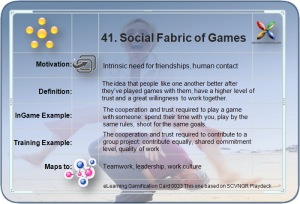eLearning Mechanics #41: Social Fabric of Games
Distributed teams and occasional contributors could benefit from social games designed to promote collaborative, but asynchronous, activities. This would be a practical way to measure current practice and gaps, model desired practices and build up a technical and behavioral capability before moving critical functions to a distributed model.
For example, a biomedical firm with a team distributed across 4 time zones could designate a role in each responsible for regulating the growth of a simulated sample culture. Circumstances scripted into the simulation could be designed to expose gaps in coverage, communication, trust and other dynamics that might impede ongoing operations.

